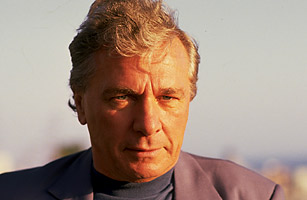
Movie composers don't write melodies so much as emotions; their music is the heartbeat to gives a film's images instant and lasting resonance. Jarre put this knowledge to use in his first famous scores: the heroic theme that lent a galloping grandeur to David Lean's 1962 Middle-Eastern Western Lawrence of Arabia; and the chorus of balalaikas, in Lean's 1965 Doctor Zhivago, that promised ecstatic reunion after the grimmest separation. In a half-century of movie work, Jarre wrote the scores for more than 150 features, but it's his underscoring for the Lean films that won him his renown — and three Oscars, for Lawrence, Zhivago and the 1984 A Passage to India.
Born in Lyon in 1924, Jarre made his way to Paris after the war and contributed incidental music to theater pieces. In 1951 Georges Franju, maker of uncompromising documentaries, hired Jarre to score Hotel des Invalides, his study of wounded veterans; it was the first of many Jarre pieces (The Longest Day, The Train, Mad Max Beyond Thunderdome) that found a sepulchral undertone in martial music. Old masters like William Wyler (The Collector) and Alfred Hitchcock (Topaz), and young turks like Adrian Lyne (Fatal Attraction) and Jerry Zucker (Ghost), called on Jarre for music that was subtle and looming, like a shiver in the shadows.
He once said that, in the flush of his career, he took so many assignments because he had three ex-wives and a lot of alimony to pay. The first of his marriages produced a son, Jean-Michel Jarre, a renowned composer of electronic music. But it was Papa Maurice whose "Lara's Theme" from Zhivago moviegoers recall whenever they think of snow, sleds and the ache of lost love.
—Richard Corliss